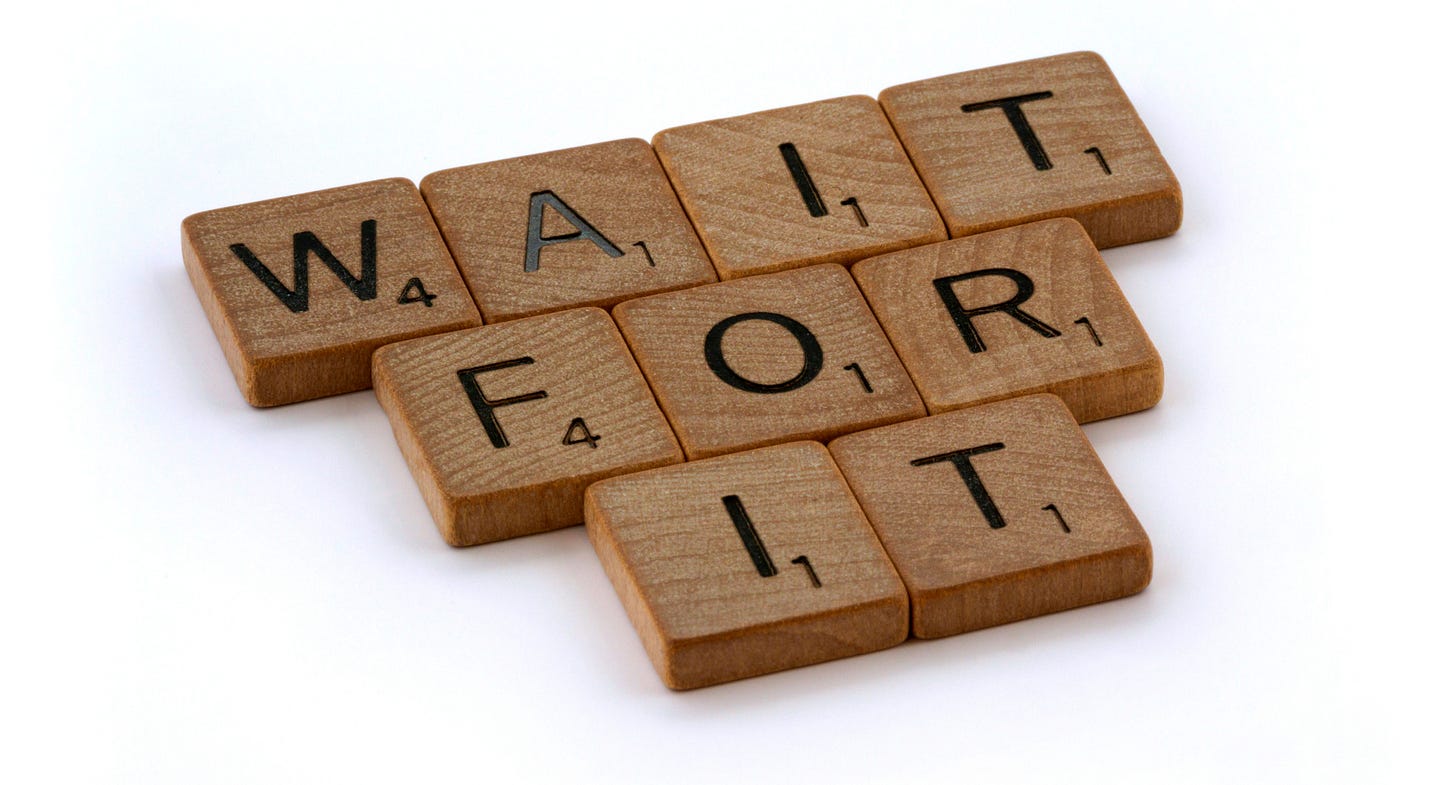Waiting to be asked
Why does almost no one self-nominate in response to a broadcast open invitation, even though most respond enthusiastically to being asked?

Volunteering to be interviewed
Since I started the AISW interview series in August 2024, every announcement and post and newsletter edition has openly invited anyone with a story about AI — and we ALL have stories about AI — to be featured as a future guest. (Details are at the end of this article.1)
In over 60+ interviews, only 1 person has taken me up on that open invitation.
But so many people have responded enthusiastically when asked.
It seems that interested people want to be asked. But why?
Some people drop hints trying to encourage an invitation. Subtle hints doesn’t always work, though. Some of us (including e.g. autistic folks) are not wired to recognize and respond to hints. 😉
A comment from an interview guest about this, on how they were hinting and hoping I would ask them, got me thinking about why people don’t just DM or reach out to take me up on the offer.
Volunteering a comment
Then a related incident popped up. A newsletter post reported on results from asking some engineering leaders for inputs about how they are using AI. The post featured answers from 11 men and — you guessed it — zero women.
I asked the author about it privately. His response was that he had posted an open invitation in his subscriber chat channel, and no women had chimed in. In his estimation, maybe 15% or so of his (quite large) subscriber base was women. (Substack doesn’t exactly make it easy for us to know gender distribution among our subscribers, or among who does and doesn’t engage in subscriber chats.) Still, with an 85-15 split in a pool of thousands of people, getting 11 men and 0 women is less than 17% likely.
What’s the deal?
These are only two cases. And there are so many variables, including the culture of the newsletter and the gender & persona of the newsletter owner. We don’t have any data on whether women join some or all STEM-related subscriber chats in proportion to their newsletter membership or at lower rates than men. Or maybe, like the questions on why women use AI less than men on their jobs in some cases2, women’s “double shifts” mean they have less time to engage promptly in subscriber chats or volunteer to be interviewed. I’m still wondering if we can find some clues.
My estimate is that about 1/2 to 2/3 of my subscribers are women. And about 2/3 of my interview guests so far (some of whom aren’t even on Substack) have been women or nonbinary.
I wondered for a bit if the hesitancy, waiting to be asked individually, might be gender-related conditioning. What some people call “imposter syndrome” is reputed to affect women more than men. So perhaps women are thinking “oh, she doesn’t mean me, I don’t qualify”. But other than that 1 exception, the men in my network haven’t been volunteering for interviews either. So it can’t be just that.
My recent guest mentioned that their habit of waiting to be asked might be culturally-based — a tradition of being modest. Their theory was that Americans would be more assertive. But that hasn’t been my experience. Just over half of my interview guests have been from the USA, and only 1 of over 30 USA guests was a volunteer.
What would *I* do?
On the flip side, I’ve been asking myself: if I saw someone else post an open invitation like mine, would *I* have the courage or confidence to speak up and invite myself?
As recently as 5 years ago, my initial reaction would likely have been “oh, they don’t mean me, I don’t qualify” and my own answer would have been no. 😆 When our Chief People Officer invited me for my first podcast interview a few years ago, an internal episode on DEI & other topics, I hesitated deeply. But she persisted & talked me into it, and it went fine.
I’ve now done 60+ interviews for “AI, Software, & Wetware” and even guested a few times on other people’s podcasts. Now, if I can do it without overcommitting myself and the topic’s important to me, my answer is a ‘yes’ for written interviews or articles. For audio, it’s a ‘definite maybe’ if I already know & trust the host or if I am confident about knowing up front what we’ll be discussing.
Looking back, I’ve been mulling why I was so hesitant before. With audio, especially, I suspect it was a trust or fear factor, not knowing how much care the interviewer would take after we recorded it. Like, what if I made a mistake or tripped over my words, and the interview host let the mistakes go into the published interview?
I’ve tried to address that kind of fear in my FAQ for guests3 and in how I process interviews & ask guests to review before I publish it. But perhaps there’s more I could be doing? Or is this fear not what’s holding most people back?
What do you think?
I’d love to hear any thoughts you all have on this!
Have you ever responded to an open invitation that interested you? Why or why not?
If you see a writer post a comment asking for opinions on a topic you know about or have experience with, do you ever chime in? Why or why not?
If you’ve ever seen my invitation to be featured as a guest, and you’d love to be featured if I asked you but are hesitating, can you share why you’re hesitating?
Is there something I could change or say in my invitation to help people feel more welcome to invite themselves?
(Comments, subscriber chats, DMs, or replies to this email are all welcome)
Here’s the wording in my current “AI, Software, & Wetware” call for participation (in the main interview list and in each interview):
AI is so pervasive nowadays, everyone’s entitled to an opinion about AI and has stories to tell. For examples, see:
Do YOU have an opinion about the benefits and harms of AI tools, or a story to tell about using AI (or having AI use your info and content)? See the guest FAQ, and let’s chat about you being a featured guest in a future interview! Or if you know someone whose voice should be heard about AI, please share the FAQ with them. Technical backgrounds or expertise are not required.
These interviews aim to include a diverse set of people — of all genders, from many locations worldwide, and across a broad range of roles, occupations, and industries.
The series goal is to provide a reality check on how AI affects people worldwide: how they use AI in personal and professional contexts, whether they have any ethical concerns using AI, and how they feel about AI companies using their data and content. For an overview on AI ethics, see this article:










Oh Karen! You hit the nail on the head with this one so hard, it echoed.
In my own experience with the TAIS interviews, I’ve had so many women decline. The reasons were mostly personal: “My head’s not in the right space,” or “I don’t think I’m the right person for this.” Others initially responded positively, then ghosted me 😅. But men? Not a single no. Some asked me to circle back in a few weeks, but they were definitely on board from the get-go.
It’s made me ask the same questions you’re asking and also forced me to look inward.
Where I’m from, a woman openly owning her strengths and telling her story can easily be labeled as proud or too assertive. There’s this unspoken expectation that you should downplay your worth, wait to be begged, or be asked twice before accepting an opportunity. I’ve been working hard to unlearn that, but it’s a real battle.
So what do we do? I think we keep pushing gently, consistently.
I remember one of my TAIS guests who was hesitant and said she didn’t feel “qualified.” I told her that as a grown woman, I’m genuinely inspired by her journey. In my context, she works in a male-dominated space and simply showing up as she is would inspire so many young minds. Only after that did she agree.
We have a long way to go, but we will get there.
And you, Karen, are doing such important work in helping us move forward. Please don’t stop.
Great article, ask and I really like the way you share your insights.
I've been trying to "play bigger" in the past few years to get beyond that gender-typing thing that goes so deep. It means that I'm more likely to say "yes" if invited, I am not overcommitted and if it matches my goals. But then, I still think I need an invite.
It would be super difficult for me to see an open invite and then "invite myself" even still. And I'm not too shy. (As you know cos you've interviewed me).
You make it super clear and easy to go on your podcast. So I don't think that's a blocker.
If people are indeed like me and need to be invited, then maybe it's about being nominated by a friend.
I will always now send someone who I think has something to offer on AI or data - straight to you because a) it's a good experience and b) we need all our voices in all our diversity out there.
We mustn't let the monoculture win!
We all have something to add. Thanks Karen!
Best, Jax